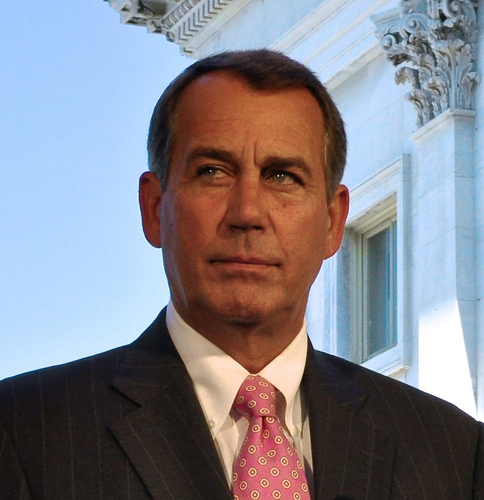UPDATE 1:47 p.m.: Speaker Boehner just sent out an email to reporters, highlighting media reports of his comments that assert that he doesn't intend to raise tax rates. It clarifies his position that the election doesn't equal a "mandate for raising tax rates” on the American people.
In a move likely calculated to distract attention away from the post-election chatter about the Republican party's state of crisis, Majority Leader John Boehner made a surprise announcement yesterday. "Because the American people expect us to find common ground," he said, "we are willing to accept some additional revenues, via tax reform." The reform would be part of a deal to avoid the impending "fiscal cliff.”

The fiscal cliff is a murky cocktail made up of the expirations of tax cuts and unemployment benefits, combined with the "sequestration" cuts that are harmful enough that the mere thought of them was supposed to be incentive enough for Congress to find some other way to tame the deficit last August. Unfortunately, Congress being Congress, they didn't, and the sequestered cuts could kick in at the end of the year if nothing is done.
What this means for surface transportation isn't completely clear. The aviation sector faces the loss of 2,200 air traffic controllers and support staff and the Coast Guard -- still reeling from some heroic missions after Hurricane Sandy -- could get a $439 million chunk taken out of its hide. But surface transportation is somewhat sheltered from these cuts because of its dedicated funding source, the Highway Trust Fund.
However, given that nearly $14 billion of the current bill's $105 billion outlay comes from sources other than the Highway Trust Fund, experts speculate that even standard transportation expenditures could fall victim to the cuts -- not to mention non-trust-fund programs like Amtrak, New Starts and TIGER.
So it's refreshing to hear the leader of the House Republicans say they're willing to back off their hard-line Grover Norquist kow-towing on taxes and explore all the options on the table. That could reduce the severity of the cuts required and, who knows, if we're opening up a conversation about some targeted tax hikes, maybe someone will notice that there's a gas tax that's been begging for some adjustment for almost 20 years now.
But what did Boehner really say?
Boehner's comments at yesterday's press conference were couched in an understanding that his party got trounced in this election and that it is “the will of the people" that the parties get past gridlock and work together to half this impending catastrophe.
But when he clarified what he meant, it didn't look quite as much like compromise. He signaled that the GOP would be open to increased revenue that is "the byproduct of a growing economy, energized by a simpler, cleaner, fairer tax code, with fewer loopholes, and lower rates for all" -- not by "government taking a larger share of what the American people earn through higher tax rates."
That's been their line all along: We don't need to raise tax rates because the absolute amount of money collected will rise if the economy improves. And the way to improve the economy is to reduce taxes and regulations on the "job creators." Conservatives are hoping that that's all Boehner was referring to.
Still, Boehner referred to "additional" revenue, not just bigger revenue. That would seem to indicate a new source of funds, not just a fantasy that existing sources will magically yield more.
So which is it, Mr. Boehner? Are you offering more partisan intransigence, or a genuine bipartisan effort to avoid a fiscal cliff that could send the economy hurtling toward a second recession?





